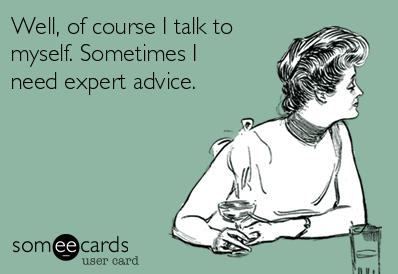I
talk to myself. Quite a bit actually. When I’m on a walk through my neighborhood, when I’m working at my desk, or when I’m trying to get my lazy ass up in the morning.
It probably looks crazy from afar, but who cares, it just works for me. From muttering under your breath to conversing with yourself in the mirror, research has shown that self-talk is actually a useful tool in a variety of situations. First let’s define what self-talk is. Self-talk is what happens when you make yourself the target of your own advice, ideas, and instructions. Experts view it as a subset of thinking, but in the simplest of explanations, you’re pretty much just having a conversation with yourself. This can be good or bad, so self-talk isn’t just a quick fix to all your problems, it also requires practice and awareness.
First let’s define what self-talk is. Self-talk is what happens when you make yourself the target of your own advice, ideas, and instructions. Experts view it as a subset of thinking, but in the simplest of explanations, you’re pretty much just having a conversation with yourself. This can be good or bad, so self-talk isn’t just a quick fix to all your problems, it also requires practice and awareness.
What happens with self-talk is you stimulate your action, direct your action and evaluate your action.Antonis Hatzigeorgiadis, Associate Professor at the University of Thessaly in Trikala, Greece
When used correctly, self-talk can transform both how you feel about yourself, as well as the actions you take. Here are 5 major benefits that talking to yourself can provide.
1. Improves Your Attention
One of the simple benefits of self-talk is that you can use it to focus your attention on specific things. For example, if a particular step in a process or action is giving you trouble, you can talk to yourself to be more aware of that issue and give it more attention the next time it crops up.
Ultimately, it is a way of learning. An approach that we tended to use far more often as kids, like when remembering how to tie our shoes or grammar rules (I before E except after C). It’s just as useful in adult life though, so if you need to focus your attention on a specific idea or instruction, try telling it to yourself.
2. Helps You Remember
Similar to bringing your focus to a particular thing, talking to yourself about something can boost your memory. I’m sure you’ve had the experience when you have to park your car at an event or an airport or any massive parking structure and you need to remember where it is.
I know that whenever I find myself in this situation, I simply repeat the location to myself a few times to make sure it sticks. Floor 5 Section F. Floor 5 Section F. Floor 5 Section F. When I come back later I have no trouble remembering 5F. Verbally repeating information can help it stick in our minds and lead to better recall later on.
3. Motivates You
Self-talk can be a great way to keep yourself motivated to do things that you don’t want to do. I often find myself talking through the reasons for why I should be waking up earlier or why I should get up and workout. For some reason, giving a voice to these situations gives me that push that I so often need.
Overall, talking to yourself can help you achieve your goals and give you motivation when it’s needed most. To be honest, I just used it to get myself to finish this post.
What are you doing?! You can’t spend all night writing this. You have a lot of other stuff to get to. Stop messing around and get it done.Aly Juma in a conversation with himself.
4. Boosts Your Confidence
At the same time, self-talk can also be a big boost to your confidence if used correctly. Believing you can do something is half the battle and self-talk can be the perfect way to build that self belief. Telling yourself you can be successful at something or that you’re good enough can be an empowering practice. It pushes doubts away and creates a sense of confidence that can help you achieve your goals.
If you don’t believe me, check out Amy Cuddy’s TED Talk (below) on body language for some awesome examples of just how powerful these actions are.
5. Helps You Solve Problems
This is probably the scenario in which I talk to myself the most. When I’ve got a situation or problem in front of me that I need to figure out, I start talking to myself almost immediately. Whether its figuring out the flow of my writing or creating a product for a client or even a big life decision, self-talk helps me make sense of things.
There’s something about having a conversation with yourself and verbalizing your thought process that brings a clarity that simply can’t be found in any other way. Overall, self-talk allows you to organize thoughts and solve problems.
__________
T
alking to yourself has a lot of value, but as I mentioned earlier, there’s a method to the perceived madness. How you talk to yourself makes a big difference on if you reap these benefits or if you make things worse. Here are a few tips on how you can get the most out of your personal self-talk.
Pay Attention To What You Say
What you say and how you say it makes a big difference in how self-talk impacts you. If you’re negative and critical it can kill off your confidence and self-belief. At the same time, if you view yourself as the greatest thing since sliced bread, you may take things too easy and not put in the work required for success.
It’s a fine line to walk, but if you try to stay positive and be aware of how you frame things, you’ll set yourself up for success.
Repeat, Repeat, Repeat
Repetition is a valuable tool when it comes to self-talk. From reminders to directions to affirmations, repetition of what you’re saying to yourself can yield great results. If you believe it, you’ll be able to do it and that belief will come from repetition.
To make repetition easier, come up with short phrases or sayings that you can use to consistently convey a message or idea that you’re trying to focus on. If you do this regularly, it will eventually become automatic.
Talk To Yourself as Another Person
When you talk to yourself, don’t refer to yourself as “I”. Instead say “you” or even your name. This gives the self-talk the sense that it is coming from another person. Research published in the Journal of Personality and Social Psychology found that this simple hack can make a big difference in the effectiveness of the self-talk.
When people think of themselves as another person, “it allows them to give themselves objective, helpful feedback,” says Ethan Kross, associate professor of psychology and director of the Self-Control and Emotion Laboratory at the University of Michigan.
Converse In Your Head
It doesn’t always have to be an audible conversation, although I found those more entertaining. I don’t know how many times I’ve been working on a problem and in frustration I string off a series of colorful words at my computer screen. Even so, it’s just as effective to have these conversations in your head.
If you’re worried about how it looks to be muttering to yourself under your breath all the time, try this approach instead.
One advantage of talking to yourself is that you know at least somebody’s listening.Franklin P. Jones
Despite how crazy it sounds or how many weird looks you may get, talking to yourself is a powerful tool that we all should take advantage of.
So if you’re struggling with a problem, lacking confidence, or just having trouble remembering something, talk to yourself and see where that conversation takes you.
Cheers!
Image via flickr


Pingback: Why Talking to Yourself is Actually a Good Thin...